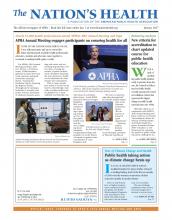Imprisonment is connected to a series of public health issues, spanning mental health, chronic disease and re-entry into the community. But being pregnant and imprisoned adds another layer of complexity that has spent little time under the public health microscope.
That is why presenters at a Nov. 1 session at APHA’s 2016 Annual Meeting and Expo on maternal and child health and the criminal justice system are trying to increase the focus on the health needs of prisoners who enter a correctional facility as a mother or who will leave as one.
According to the Bureau of Justice Statistics, there are over 221,000 women in prison or jail, said Carolyn Sufrin, MD, PhD, an assistant professor in the Johns Hopkins School of Medicine’s Department of Gynecology and Obstetrics.
In addition, the American Civil Liberties Union estimates that 12,000 pregnant women are in custody annually, with 4 percent of state prisoners and 3 percent of federal prisoners pregnant at admission as of 2004, said APHA member Jennifer Bronson, PhD, a statistician for the Bureau of Justice Statistics. This does not include jail populations, she noted.
Still, there is a dearth of health information about incarcerated pregnant women, Sufrin told attendees. And there is little being done in terms of prenatal and postpartum care while they are imprisoned, she added.
“What happens to these women behind bars tells us a lot about our society and how we value pregnant women, especially pregnant women who are disproportionately women of color and disproportionately poor women,” Sufrin said. “Understanding what is happening to these women has tremendous implications not only for the criminal justice system, but for our entire society.”
This prompted Sufrin to work with fellow researchers on the Pregnancy in Prison Statistics Project. The ongoing project, which kicked off in May, asks prisons and jails across the U.S. to report data such as how many pregnant women are admitted as well as maternal and neonatal deaths. Optional data on pregnancy conditions and infant information include occurrence of substance use disorder, requests for abortion and infant placement.
As of Nov. 1, 21 state department of correction facilities, six jails and three juvenile facilities were participating. After three months of data, there were 173 live births, 19 miscarriages and six abortions reported.
“Though it may not be fully representative, any data is better than no data at all,” Sufrin said. “And I hope that they’ll continue to implement this tracking for the future. We’re hoping that the data will drive policy recommendations as well as future research.”
The U.S. Department of Health and Human Services’ Office of Women’s Health, in collaboration with John Snow Inc., is working on a Reentry Guide that would provide anyone working with women who are re-entering society after incarceration with trauma-informed and gender-responsive strategies.
Trauma-informed services mean recognizing the role trauma plays in a woman’s pathway to crime, considering past and current trauma, and supporting ways to cope and avoid re-experiencing trauma.
Up to 90 percent of women experience trauma prior to incarceration, said APHA member Michelle Hoersch, MS, a regional women’s health coordinator at the HHS Office on Women’s Health.
“(Recognize that) gender makes a difference,” Hoersch said. “Women are by definition part of a community, a fabric within their family.”
Three re-entry organizations in Tulsa, Oklahoma; New York City; and Cambridge, Massachusetts, are now assisting with developing the guide, which should be available in early 2017, Hoersch said.
“We thought re-entry planning was essential to help women be on a different trajectory,” Hoersch said. “We believe that successful re-entry and reduced recidivism can improve women’s health, reunite families, increase public safety and reduce criminal justice costs.
A version of this story was published on APHA’s Annual Meeting Blog.
- Copyright The Nation’s Health, American Public Health Association









